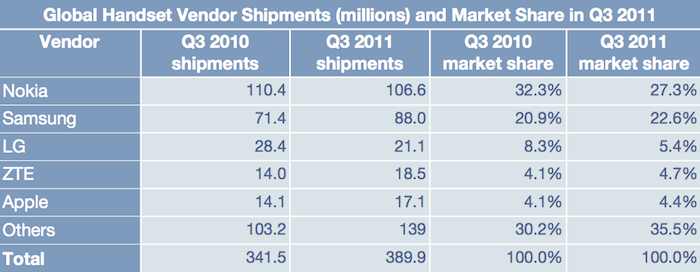Apple slips to No. 5 handset maker, No. 2 in smartphones after iPhone transition quarter
Research group Strategy Analytics reported on Thursday that Apple slipped to fifth place in terms of global mobile phone shipments after its weakest quarter of the year. Nokia maintained the top spot with 106.6 million units shipped and 27.3 percent market share, while Samsung took second place with 88 million units.
LG took third with 21.1 million units, and Chinese handset maker ZTE shipped 18.5 million phones, besting Apple's 17.1 million iPhone units.
Last week, Apple reported a sequential drop in iPhone sales from 20.34 million units in the June quarter to 17.07 million in the September quarter. The company attributed the sales decline in part to the rumors that a new iPhone was soon to be released.
But, Apple executives believe that the slide was merely a temporary setback. CEO Tim Cook said during a conference call last week that he is confident the company "will set an all-time record for iPhones this quarter."
Thursday's report noted that global handset shipments grew 14 percent annually to reach 390 million units in the third quarter.
Smartphones
A separate report from Strategy Analytics showed that Samsung had risen to the top of the smartphone competition with estimated shipments of 27.8 million units. Apple dropped to second place, though it managed to maintain a lead over former leader Nokia.
Apple had slipped into first place for the first time in the June quarter, but was unable to hold onto it because of heavy anticipation of the iPhone 4S.
“Apple’s global smartphone growth rate slowed to just 21 percent annually in Q3 2011, its lowest level for two years," Neil Mawston, Director at Strategy Analytics, said. "We believe Apple’s growth during the third quarter was affected by consumers and operators awaiting the launch of the new iPhone 4S in the fourth quarter, volatile economic conditions in several key countries, and tougher competition from Samsung’s popular Galaxy S2 model.â€
Overall, global smartphone shipments grew 44 percent since the third quarter of 2010, significantly outpacing the growth in the global mobile phone industry.
But, not everyone benefitted from the growth. Nokia fell far over the past year, losing more than half its market share. By comparison, Samsung saw an impressive rise from 9.3 percent share last year to 23.8 percent in the third quarter.
“Nokia reached 14 percent global smartphone share in Q3 2011, more than halving from 33 percent in Q3 2010," Tom Kang, Director at Strategy Analytics, noted. "The transition from Symbian to Microsoft as Nokia’s main smartphone platform has clearly been a very challenging process this year. The recent launch of the new Microsoft Lumia portfolio has helped to raise Nokia’s profile, and Nokia will be hoping the partnership with Microsoft can drive at least an L-shaped recovery in its global smartphone market share over the next few months.â€
At its Nokia World conference on Wednesday, the company unveiled its first phones running Microsoft's Windows Phone platform. The Finnish handset maker announced earlier this year that it would abandon its Symbian mobile operating system in favor of Microsoft's Windows Phone. The bumpy transition has resulted in a signficant loss in market share.
With Apple and Samsung set up to fight for first and second place in the smartphone market, the stakes remain high in the two companies' ongoing legal battle. Earlier this week, a judge denied a Samsung attempt to block the Italian launch of the iPhone 4S. Apple started the altercation in April, accusing the Samsung of copying its iPhone and iPad devices for its Galaxy smartphones and tablets.
 Josh Ong
Josh Ong












 Mike Wuerthele
Mike Wuerthele
 Malcolm Owen
Malcolm Owen
 Chip Loder
Chip Loder

 William Gallagher
William Gallagher
 Christine McKee
Christine McKee
 Michael Stroup
Michael Stroup
 William Gallagher and Mike Wuerthele
William Gallagher and Mike Wuerthele






